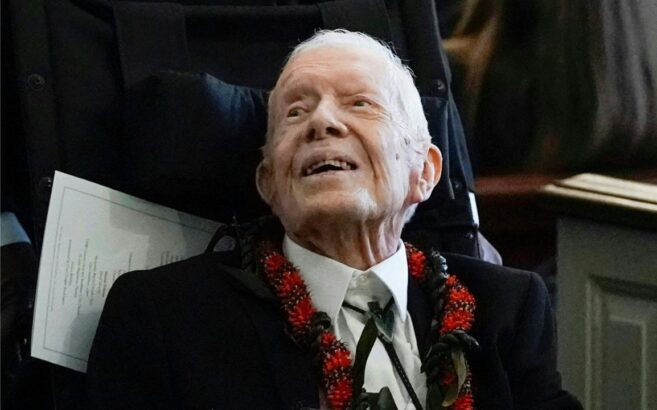Former President Jimmy Carter was a pioneer in calling out Israeli apartheid (and being labeled “antisemitic”)
By Allan C. Brownfeld, reposted from WRMEA, the Washington Report on the Middle East, May 2023 issue
(See NOTE below the article for more info on Israeli apartheid.)
IT IS IMPORTANT TO REMEMBER the brutal assault former President Jimmy Carter faced from militant supporters of Israel and the number of times there were attempts to silence him, claiming he was “anti-Semitic,” the usual tactic used to silence criticism of Israel.
In Israel, this tactic is openly discussed. Shulamit Aloni, a former Israeli Minister of Education and winner of the Israel Prize, declared: “It’s a trick. We always use it. When from Europe somebody criticizes Israel, we bring up the Holocaust. When in the United States, people are critical of Israel, then they are anti-Semitic.”
Carter dedicated himself to peace and human rights around the world. He always insisted that Israel was obligated to suspend building new settlements on the West Bank. He argued that settlements were a roadblock to a two-state solution and a peaceful resolution of the conflict. He warned that Israel was on the road to apartheid.
Dedicated to peace and human rights around the world, Carter’s tireless efforts to bring Israel and Egypt together in a peace agreement during the 1978 negotiations at Camp David are widely viewed as the most consequential contribution any U.S. president has made toward Israel’s security since its founding. This represented the first personally negotiated peace agreement since Theodore Roosevelt successfully settled the 1904-05 Russo-Japanese War. Even Menachem Begin reluctantly agreed that Carter “had worked harder than our forefathers did in Egypt building the pyramids.”
Yet Carter was repaid for his success and for his commitment to both Israeli security and Palestinian rights with a consistent campaign of vilification by American Jewish leaders. Most of them never forgave him for the tenacity with which he pursued his vision of an evenhanded Middle East peace.
In 1978, the American Jewish Committee’s Washington representative Hyman Bookbinder called Carter’s Middle East policy an “anti-Israel campaign.” The New York Times columnist William Safire titled a column, “Carter Blames the Jews.” Carter himself lamented that whenever an issue arose between the U.S. and Israel, “American Jewish leaders would always side with the Israeli leaders and condemn us for being even-handed in our concern for both Palestinian rights and Israeli security.”
When he wrote the book Palestine: Peace Not Apartheid, which became a New York Times best-seller in 2007, the attacks on Carter became brutal. Deborah Lipstadt, then a professor at Emory University, now Special State Department Envoy to Monitor and Combat Anti-Semitism, reviewed the book for The Washington Post and accused Carter of relying on “anti-Semitic stereotypes.” She charged that Carter “has repeatedly fallen back on traditional anti-Semitic canards. When David Duke spouts it, I yawn, when Jimmy Carter does, I shudder.”
At the time, the Anti-Defamation League’s Abraham Foxman called Carter “a bigot” and denounced him in paid newspaper advertisements around the country. Martin Peretz, publisher of The New Republic and an outspoken Zionist, called Carter a “Jew-hater” and “a jackass.” We could fill pages with the bitter assaults on Jimmy Carter by Zionist activists whose first charge against anyone who criticizes Israeli policy is “anti-Semitism.”
The organized Jewish community should apologize for the manner in which it assaulted the good name of Jimmy Carter, even comparing him to David Duke. Now that more and more Jewish leaders are themselves critical of Israel, shall we suddenly discover that they, too, are anti-Semitic?
Allan C. Brownfeld is a syndicated columnist and associate editor of the Lincoln Review, a journal published by the Lincoln Institute for Research and Education, and editor of Issues, the quarterly journal of the American Council for Judaism.
NOTE: Carter’s Palestine: Peace Not Apartheid, a New York Times Best Seller book, published in 2006, generated controversy for characterizing Israel’s policies in the Israeli-occupied West Bank and Gaza Strip as amounting to apartheid.
In an interview, Carter defined apartheid as the “forced separation of two peoples in the same territory with one of the groups dominating or controlling the other.”
In remarks broadcast over radio, he said:
When Israel does occupy this territory deep within the West Bank, and connects the 200-or-so settlements with each other, with a road, and then prohibits the Palestinians from using that road, or in many cases even crossing the road, this perpetrates even worse instances of apartness, or apartheid, than we witnessed even in South Africa.
NOTE: In appraising Israel’s policies as a form of apartheid, President Carter was ahead of his time.
Groups have characterized Israel’s rule to be apartheid since at least 2010 (details here).
Since then, multiple human rights organizations have documented and reported on Israeli apartheid, including: Human Rights Watch, Amnesty International, the Israeli human rights groups B’Tselem, and Yesh Din , the UN Special Rapporteur on Palestine, the UN Economic and Social Commission for Western Asia (ESCWA), and Harvard Law School’s International Human Rights Clinic.
Most recently and perhaps most significantly, the International Court of Justice in July 2024 ruled Israel’s mistreatment of Palestinians to be a form of segregation and apartheid.
It further ruled that Israel’s occupation of Palestinian land, including its settlements in the West Bank, is illegal and must end.
The International Court of Justice’s advisory opinion also called for reparations for Palestinians who have lived under Israel’s occupation since it began in 1967, an unprecedented step for the court.
RELATED READING:
- Speaking frankly about Israel and Palestine, by Jimmy Carter for the LA Times (2006)
- Interview with Jimmy Carter about his book, Peace Not Apartheid (2006)
- President Carter: Congress should reject unconstitutional anti-BDS laws (2019)





